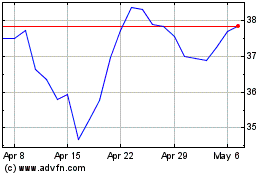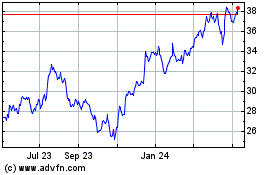By Cara Lombardo
Corporate deal making, prone to unexpected twists and turns in
the best of times, has been upended by the coronavirus
pandemic.
Many companies from Xerox Holdings Corp. to Axalta Coating
Systems Ltd. have been re-evaluating takeover deals as employers
shift their focus to ensuring they have enough cash to stay afloat
and pay workers. Those plotting initial public offerings, such as
Airbnb Inc., may postpone them.
Overall merger volume, which was already having a sluggish start
this year, has come to a virtual standstill in the past two
weeks.
The value of announced mergers in the first quarter through
Monday is down 33% from a year ago to $572 billion, a seven-year
low. In the U.S., the decline is even more acute at more than
50%.
IPOs so far look OK compared with the slow start in 2019, when a
partial government shutdown precluded companies from moving forward
with listings, but bankers now expect this year will fall far short
of last year's relatively strong total. For companies to launch
successful IPOs, they generally need stable -- ideally rising --
markets.
"Almost every variable is changing, whether it be CEO and board
confidence, the availability of plentiful financing or stock
prices," said Steven Baronoff, Bank of America Corp.'s chairman of
global mergers and acquisitions. Aside from those with urgent
needs, most companies have put deal making on hold, he said.
Even if there was a will to pursue mergers and other deals, the
new coronavirus has thrown up a number of new barriers. Debt
financing has dried up as banks turn off the spigot to meet more
pressing client needs. Wild day-to-day swings in stocks make
agreeing on a price that much harder, and the intensive
face-to-face contact normally required to seal a transaction is now
forbidden.
If there isn't a quick and substantial turnaround, 2020 could
mark the end of a historic deal surge that was made possible by the
long-running bull market for stocks and credit. Three of the past
five years were among the top five on record for M&A activity
globally.
That could jeopardize one of Wall Street's biggest moneymakers.
For example, Goldman Sachs Group Inc.'s investment-banking unit,
which advises companies on M&A and IPOs, among other things,
accounted for just under 20% of the firm's revenue last year.
The financial and economic swoon has created opportunity for
deal makers in other corners of the market. Bankruptcy and
restructuring advisers have been inundated in the past two weeks by
calls from potential clients, particularly in such areas as energy
and retail.
Peter Weinberg, founding partner of boutique investment bank
Perella Weinberg Partners, said conversations with clients have
intensified and in some cases pivoted to topics such as credit and
restructuring.
"The breadth of issues has increased," he said.
Private-equity firms, hedge funds and other investors, including
Warren Buffett, who are flush with cash are circling the
hardest-hit companies in the travel, lodging and entertainment
sectors, eager to offer financial lifelines should they be needed,
people familiar with the matter say.
"Cash is at a premium right now," said Jim Woolery, head of
M&A and corporate governance at law firm King & Spalding
LLP.
Traditional consolidation, however, won't ramp up until
companies are again able to forecast their earnings with any degree
of certainty, Mr. Woolery predicts.
Another potential source of deal activity meanwhile, advisers
say, is hostile M&A, with companies emerging from the crisis in
relatively strong positions moving on those that struggle to
recover.
But right now, companies for the most part are slamming on the
brakes. Several merger deals that had the potential to be among the
largest of the year were quickly put on pause as the new
coronavirus began to spread.
Xerox said March 13 it was postponing meetings with shareholders
to push its $35 billion hostile pursuit of printer maker HP Inc. to
give priority to the well-being of its employees and customers. HP,
which has called Xerox's offer inadequate, said March 25 that such
a debt-heavy combination in the current economic environment "could
be disastrous."
Marathon Petroleum Corp. was close to selling its sprawling
Speedway gas-station unit for more than $20 billion before a dip in
oil and stock prices gave its Japanese suitor cold feet. Marathon,
which named a new chief executive officer in March, is likely to
revisit spinning off or selling the unit after things stabilize,
according to people familiar with the matter.
Axalta, a paint maker, had been negotiating a roughly $7.5
billion sale to PPG Industries Inc. and buyout firm Clayton
Dubilier & Rice, people familiar with the matter said. Those
talks have stalled, the people said, after Axalta's stock cratered
and, like many others, the company pulled its financial
guidance.
Airbnb, meanwhile, was set to be the banner IPO of the year
before a decline in travel and mounting losses threw its plans into
doubt. And J.Crew Group Inc. shelved the planned spinoff of its
Madewell brand to focus on debt payments, according to people
familiar with the matter.
There are a few companies forging ahead. EBay Inc. for now at
least is pushing with a sale of its classified-ads unit as activist
investors look on. And Coty Inc., the struggling beauty company
that previously announced plans to sell its professional-hair-care
and Brazilian units, said March 20 the process would continue. It
has been holding virtual meetings with potential buyers, people
familiar with the matter said.
Write to Cara Lombardo at cara.lombardo@wsj.com
(END) Dow Jones Newswires
March 31, 2020 07:14 ET (11:14 GMT)
Copyright (c) 2020 Dow Jones & Company, Inc.
Bank of America (NYSE:BAC)
Historical Stock Chart
From Mar 2024 to Apr 2024

Bank of America (NYSE:BAC)
Historical Stock Chart
From Apr 2023 to Apr 2024
